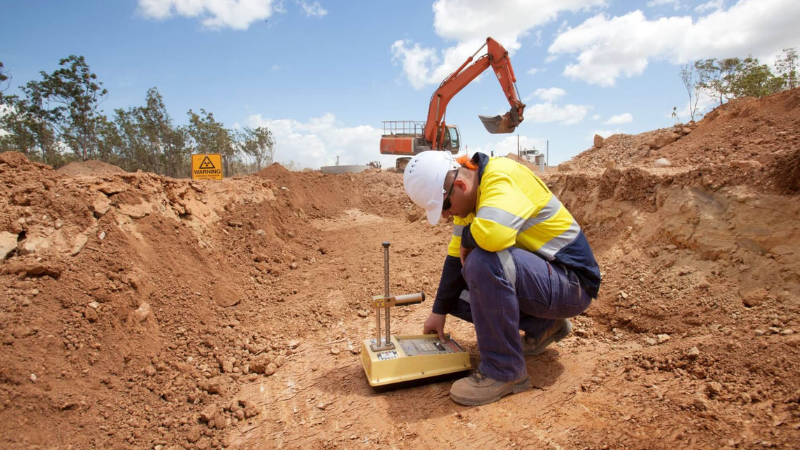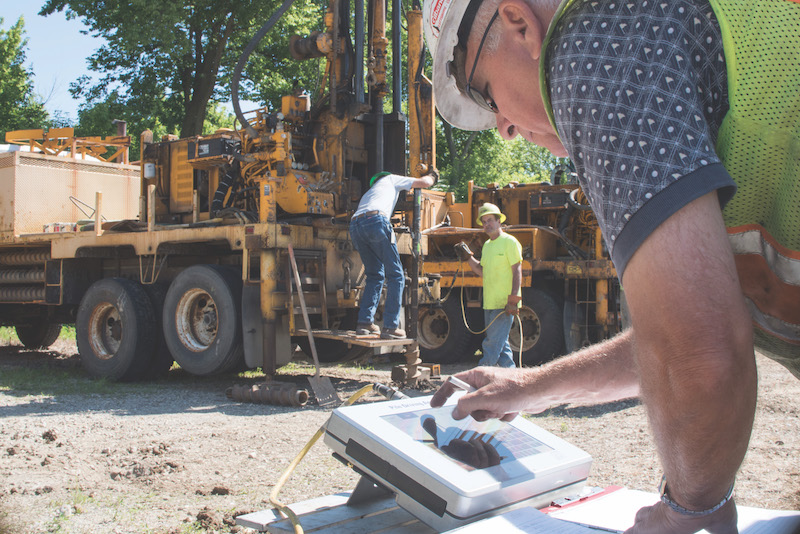Exploring the Benefits of Geo Tech Engineering for Urban Planning
Exploring the Benefits of Geo Tech Engineering for Urban Planning
Blog Article
Comprehending the Comprehensive Duty of Geotechnical Designers in Ground Examination and Dirt Evaluation for Building And Construction Projects
Geotechnical engineers are important to the success of building projects, providing important insights via extensive ground investigations and soil analysis. Their knowledge in assessing dirt habits and utilizing sophisticated screening methods educates important decisions that copyright architectural stability and safety.
Function of Geotechnical Designers
The critical duty of geotechnical engineers in building and construction jobs can not be overemphasized, as they offer essential understandings right into soil habits and website problems. These experts are entrusted with assessing the suitability of the ground for different sorts of structures, making sure safety and security and security throughout the building and construction process. Their know-how incorporates a variety of activities, consisting of website characterization, dirt sampling, and research laboratory testing, which are critical for establishing the physical and mechanical residential or commercial properties of the dirt.
Geotechnical designers use their searchings for to establish foundational styles that suit load-bearing needs and mitigate risks associated to dirt liquefaction, settlement, and incline security. They play a vital duty in determining possible hazards, such as groundwater changes and contamination, which can considerably influence project stability. Additionally, they work together with designers, civil engineers, and service providers to guarantee that geotechnical considerations are incorporated right into the overall design and construction phases.
Ground Examination Methods
Ground investigation strategies develop the backbone of geotechnical design, making it possible for designers to obtain an extensive understanding of subsurface problems. These methods are necessary for analyzing dirt properties, establishing groundwater levels, and identifying potential geological threats.
Common approaches consist of borehole exploration, which enables for the removal of soil examples at numerous depths, providing essential information for evaluation. Additionally, in situ testing methods, such as Conventional Penetration Examinations (SPT) and Cone Penetration Tests (CPT), are utilized to examine dirt toughness and density directly in the ground.
Geophysical methods also play a substantial duty in ground investigations. Techniques such as seismic surveys and electrical resistivity tomography help examine subsurface attributes without substantial excavation. geo tech engineering. These non-invasive techniques are specifically helpful in big or delicate areas where disturbance should be decreased
Moreover, exploratory trenches can be excavated to aesthetically inspect dirt layers and determine any anomalies. Each of these strategies adds distinct insights, permitting geotechnical engineers to develop precise website evaluations and educate layout choices. In summary, a combination of these ground examination techniques is important for effective building and construction projects, ensuring safety and architectural honesty.
Dirt Evaluation Techniques
Dirt analysis techniques are vital for understanding the physical and chemical homes of soil, which directly affect the style and building of foundations and various other frameworks. Different methods are utilized to assess dirt features, guaranteeing that geotechnical engineers acquire accurate data for notified decision-making.
One commonly made use of approach is grain size evaluation, which identifies the circulation of fragment sizes within a dirt sample. This is crucial for identifying soil types and forecasting their habits under lots. Another necessary technique is Atterberg restrictions testing, which evaluates the plasticity and dampness content of fine-grained soils, supplying insights into their design properties.

Area examinations, such as Standard Penetration Examinations (SPT) and Cone Infiltration Examinations (CPT), offer important in-situ data relating to dirt stamina and stratification. Collectively, these dirt evaluation techniques create the structure of geotechnical investigation, allowing engineers to make risk-free and efficient frameworks customized to the details problems of the website.
Threat Reduction Techniques
Carrying out effective risk mitigation techniques is crucial for geotechnical engineers my review here to deal with possible difficulties in building and construction jobs. These approaches are vital in recognizing, assessing, and taking care of dangers related to soil problems, site stability, and groundwater variations, which can negatively affect task results.
One primary approach includes carrying out extensive website investigations that make use of sophisticated geophysical techniques and comprehensive dirt tasting. By getting exact data on subsurface problems, engineers can make educated choices on layout and building and construction approaches. Furthermore, using predictive modeling devices enables the simulation of various situations, making it possible for engineers to anticipate potential issues and implement precautionary measures.
Moreover, establishing clear communication networks amongst project stakeholders promotes a joint method to risk monitoring. Routine updates and consultations make sure that all celebrations understand the developing website conditions and can adjust their strategies as necessary.

Influence on Construction Jobs
The performance of risk mitigation strategies directly affects the total success of building and construction projects. Geotechnical engineers play an essential function in this domain, as their expertise in ground investigation and soil analysis informs crucial decisions throughout the building process. By precisely evaluating dirt conditions and identifying prospective dangers, these specialists enable project teams to develop reliable remedies that lower threats related to ground instability, water infiltration, and various other geotechnical difficulties.
The influence of detailed geotechnical evaluation is evident in numerous facets of building and construction jobs, including price monitoring, job timelines, and structural integrity. Early identification of issues permits prompt interventions, lessening costly delays and spending plan overruns. In addition, a comprehensive understanding of site conditions boosts the design and design process, making certain that structures are constructed to hold you can try these out up against ecological pressures and possible all-natural disasters.
Inevitably, the contributions of geotechnical engineers are indispensable to the successful implementation of construction tasks. Their work not just fosters security and conformity with policies yet likewise boosts the long-term sustainability of frameworks, making sure that they execute efficiently throughout their desired life visit their website expectancy. The partnership in between other stakeholders and geotechnical teams is vital for attaining optimal outcomes in construction ventures.
Verdict
To conclude, geotechnical engineers do a crucial function in construction projects with comprehensive ground investigations and dirt evaluations. Their proficiency in analyzing dirt behavior, employing different examination methods, and carrying out danger mitigation techniques substantially adds to the structural stability and security of built environments. By working together with multidisciplinary teams, these professionals boost task performance and make certain conformity with security standards, ultimately leading to successful building and construction results and decreased potential risks.
Geotechnical engineers are essential to the success of building projects, providing important understandings with extensive ground examinations and dirt evaluation.The critical role of geotechnical designers in building tasks can not be overemphasized, as they supply essential understandings into dirt habits and site problems. Their proficiency incorporates a large variety of activities, consisting of site characterization, dirt sampling, and research laboratory testing, which are crucial for figuring out the physical and mechanical residential properties of the soil.
By accurately assessing soil conditions and recognizing possible dangers, these experts allow job teams to create reliable services that lower risks connected with ground instability, water seepage, and various other geotechnical difficulties.
In conclusion, geotechnical engineers execute an essential feature in construction projects with thorough ground examinations and soil analyses.
Report this page